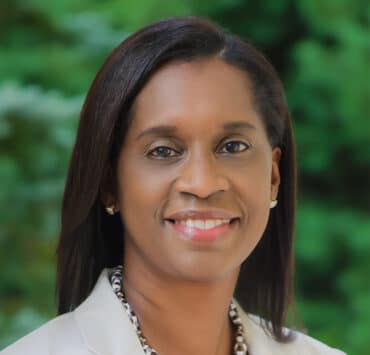|
Getting your Trinity Audio player ready...
|
Jordan Martell is focused on the future—but his philosophies lie somewhere in the fifth century BC. The vice president of innovation law at Pacific Life Insurance Company holds a master’s degree in ancient and classical Greek language and literature. And while that knowledge has provided him a solid foundation, he also sees the value and necessity of technology for those working to navigate the difficult terrain of the criminal justice system.
While discussing pro bono work he did with the Minnesota Supreme Court to help create more humane and technology-enabled access to justice, Martell casually mentions particle physics (his current passion), and how particle collider technology provides a road map for creating models and algorithms that might ultimately make life easier for criminal record expungement.
When Martell explains it, particle physics doesn’t seem like a mental leap. The lawyer’s ability to see the potential of innovations and relay that to others seems to be a hallmark of his success.
“The Romans were famous not necessarily for inventing new technologies, but for finding ways to redeploy and rethink them to use at the highest levels,” Martell explains. “That’s something I’ve tried to apply to my own life. I look for areas that I don’t know much about, and I just like to try and figure out how they work.”
“The best leaders I’ve worked with try to set those natural proclivities aside and operate as a scientist.”
Jordan Martell
At Pacific Life, Martell has been given the opportunity to help the legal department modernize itself.
“It’s a difficult balance because there is a fantastic established culture here, but that doesn’t mean you can’t change the processes and procedures about how things are working,” he explains. “I was brought in to look at how we practice and work to modernize those practices, along with working with our different design studios to help them navigate regulations that, in many cases, haven’t been updated in many years. You’re trying to help a team design a new product with laws that were drafted before you were born.”
As technological innovation has sped up, Martell says, the life insurance industry has lagged behind evolving consumer experiences and expectations, and he wants to change that.
“I try to keep the central purpose of this industry at the forefront when working to drive change,” he explains. “I feel like even the most diehard Luddite with no interest in technology understands that the mission of helping communities gain security and confidence is more important than, for instance, doing everything with a pen and paper.”
Human bias is an endless source of fascination for him. Martell has read anthropological research indicating that humans tend to operate in three modes: preacher, politician, or prosecutor. The preacher proselytizes and extols the virtue of their agenda. The politician works to generate consensus for their agenda. The prosecutor seeks to negate the argument against their agenda.
“The best leaders I’ve worked with try to set those natural proclivities aside and operate as a scientist,” Martell says. “You want the evidence to help inform the right course of action as opposed to lobbying and jockeying.”
“I just can’t encourage pro bono work enough. It makes you a better lawyer, and it makes your community a better place.”
Jordan Martell
While Martell continues to look for ways to ensure safety and security for customers, he’s also done extensive pro bono work. In addition to his work for the Minnesota Supreme Court, Martell is chair of the innovation subcommittee for the American Council of Life Insurers and serves on the board of Community Legal Aid of Southern California, where he does most of his pro bono work since relocating from Minnesota. His volunteer efforts are varied, but generally focus on helping those who don’t have the financial means to secure legal services on their own.
“Lawyers have what we politely call ‘limited franchise,’ which is kind of a euphemism for a monopoly,” the lawyer says. “In order to protect the public from unqualified legal representation, bar associations impose a strict quality control process on who can practice law in a state. The net result is that this restricts the number of people that can practice law in any state, and so there is always a higher demand and lower supply, which drives prices up.”
Martell says pro bono work should be an essential component of every lawyer’s outlook, in service of the question: How can I repay the community for the privilege that I have been given to practice law?
His affinity for technology led to an effort to minimize obstacles for community members seeking access to the justice system. “I would spend about two hours with each client, and the first hour would almost exclusively be filling out applications to the court,” Martell says. “The second hour would be filling out waivers to ask for their fees to be waived. It seemed like large swaths of the process could be automated. This is important work, and it’s just getting started.”
While “justice for all” is a foundational promise of the United States, Martell believes it also creates a moral obligation for lawyers to service and a prime opportunity to meaningfully enhance any legal career.
“I want to inspire others to think more about their careers and their communities,” Martell says. “I just can’t encourage pro bono work enough. It makes you a better lawyer, and it makes your community a better place.”
Merchant & Gould P.C.:
“Curiosity and creativity lead Jordan’s inventive approach to finding business-oriented solutions to legal challenges. Jordan is a trusted advisor because of his depth of analysis and understanding of business goals.”
–Heather Kliebenstein, Partner


